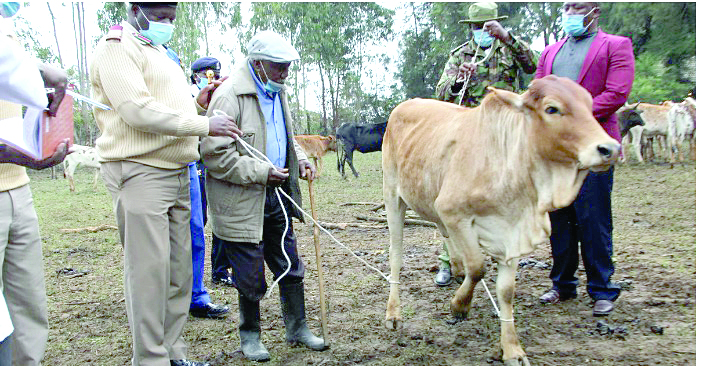Stiff penalties await rustlers if Parliament enacts new Bill

People who steal livestock or farm produce will face stiff penalties if a new bill on the prevention and combating of livestock theft is enacted.
The Prevention of Livestock and Produce Theft Bill, 2023 sponsored by Nandi Senator Samson Cherargei seeks to provide a framework for the establishment of mechanisms for preventing, combating and eventually eradicating livestock and produce theft.
Cherargei in his bill argues that livestock theft is a problem that has continued to persist over time and has often led to the loss of life and destruction of property.
“Despite the existence of the Stock and Produce Theft Act and provisions under the Penal Code prohibiting livestock and produce theft, the practice has continued unabated and it has therefore become necessary to address this issue comprehensively through a number of interventions including legislation,” said Cherargei. His bill creates a number of offences relating to livestock, and produce theft, and imposes stiffer penalties on commission of the offences.
“A person who steals livestock or produce, or receives any livestock or produce knowing or having reason to believe it to be a stolen livestock or produce, commits an offence and shall be liable, on conviction, to a term of not less than twenty years.”
Threat of violence
It further provides that where, for stealing any livestock or produce, or in the course of stealing any livestock or produce, violence or the threat of violence is used, such person is liable, on conviction, to a life term of imprisonment.
The bill further stipulates that a person who has in his or her possession any livestock which may reasonably be suspected of being stolen shall, if that person fails to prove to the satisfaction of the court, commits an offence and is liable on conviction to imprisonment for a term of not less than 15 years.
“A person who has in their possession produce which may reasonably be suspected of being stolen or unlawfully obtained commits an offence and is liable on conviction, to imprisonment for a term of not less than 10 years.”
The Bill provides a framework for the branding of livestock and the requirement to obtain a removal permit when livestock is to be moved from one premises to another.
County register
Provisions of the Bill state that every county executive committee in the respective county shall establish and maintain a county register of livestock brands, receive application for and register brands, design and formulate strategies and mechanisms for the prevention, combating and eradicating livestock theft.
In addition, the CEC member shall also establish systems for the tracking of stolen livestock, promote the abandonment of livestock theft, facilitate the acquisition of equipment for monitoring and managing the movement of livestock and carry out such duties or functions as may be necessary.
“Every livestock owner shall apply to the county executive committee member for the registration in their name of a brand of such nature and dimensions as shall be prescribed in county legislation,” the Bill reads in part.
The Bill further provides that a livestock owner who intends to remove livestock of which he is the owner from the premises where they are ordinarily kept to other premises for the purpose of sale and slaughter or any other purpose shall obtain a removal permit from the inspector.
Cherargei in his Bill tabled before the House argues that a removal permit issued by the inspector shall be in triplicate and clearly indicate particulars of the livestock owner, the date of removal of the livestock and the purpose for the removal. The permit shall also indicate the number and type of livestock to be moved, particulars of the brand of which the owner of the livestock is the proprietor.
However, the inspector shall not issue a removal permit if the premises the livestock are being moved from or the destination of the livestock is within an area declared to be an area infected by a notifiable disease or the Act or any other written law has not been complied with.












